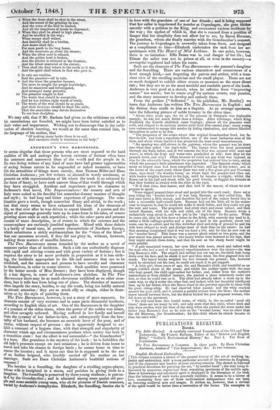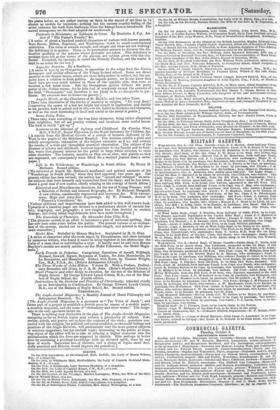PUBLICATIONS RECEIVED.
Boma.
The Bale Revised. A carefully corrected Translation of the Old and New Testaments. By Francis Barham, Editor of the "Hebrew and English Bible," "Collier's Ecclesiastical History," &c. Part L The Book of Ecclesiastes.
The Two Baronesses; a Romance. In three parts. By Hans Christian Andersen, Author of "The Improvisatore," &c. In two volumes.
English Medieval Embroidery.
[This volume contains a sketch of the general history of the art of working ta- pestry and embroidery, with a more particular account of its exercise in England, and of the character and locality of some existing remains. The sketch is followed by practical directions for pursuing the art," by another hand "; the text being il- lustrated by numerous engravings from remaining specimens of the middle ages. More of knowledge and scholastic spirit is displayed in the literature of the book than the letterpress of such works generally exhibits; it Beans to be a labour of love, emanating from one of those ecclesiastical antiquarians who are bent on restoring medieval arts and usages. It strikes us, however, that a revival of the spirit would be better than a restoration of the forms. The examples in
the plates before us are rather curious as facts in the record of art than to 10 chosen as models for imitation: nothing but the earnest trustful feeling of the artist redeems his work from burlesque when the human form is introduced. The sacred monograms are the best adapted for needlework.]
Portraits in Miniature; or Tableaux de Coeur. By Henrietta J. Fry, An- ther of "The Pastor's Family," &c. [A series of about a hundred poetical characters of various well-known persons, from Bacon, Milton, Napoleon, and Washington, down to small contemporary celebrities. The verse is smooth enough, and images and ideas are not wanting: the deficiency is in matter. There is no penetrative acumen to discover the dis- tinctive qualities of the persons whose portraits are taken. This deficiency is perhaps more felt as the names of the persons are seldom given with the cha- racter. Cromwell, for example, is called the Princely Puritan, and the reader is sent to an index for the key.] Lays for Patriots. By a Southern. [A series of lays by an Orangeman, in opposition to the songs from the Nation newspaper and similar effusions of the loung Ireland school. Some are direct answers to the Repeal verses, others are more independent in subject, but the ma- jority have a relation to Irish politics. As regards poetry, we do not know that these lays are very much inferior to those of the opposite side, that were so vaunted a few years since. But the Orangeman speaks without the party power of the Nation verses; for befalls font of everybody except the extreme of the Irish " Protestants " and therefore is not likely to be so acceptable to par- tisans. He succeeds best in humorous parody.] Angels Work, or the Choristers of St. Mark's; and two other Tales. [Three tales illustrative of the truths of morality or religion. "Do your Best," —narrating the career of a boy not bright but steady in application, and dutiful to his permits, both in school and in life,—is the fullest in incidents and character, as well as the most interesting in itself and useful in the moral it points.]
Seven Fairy Tales. [These tales want something of the true fairy character, being rather allegorical than sylphlike; but all are prettily written, and inculcate some useful lesson. The book is nicely "got up."I
Lectures on the Diseases of Infancy and Childhood. By Charles West, M.D., F.R.C.P., Senior Physician to the Royal Infirmary for Children, &c. [A reprint from the Medkal Gazette of a course of lectures delivered by Dr. West to the pupils of the Middlesex Hospital. The lectures exhibit a plain and orderly arrangement, exhaustive of the subject extensive as it is; and contain the results of a wide and thoughtful practical observation. The subject of the diseases of infancy and childhood, however important to the faculty and to fami- lies, wants that general interest for the public at large which attaches to some other disorders. The lectures, sensible as they are in view, and plainly as they are expressed, are consequently more fitted for a medical Journal than a news- paper. j Life in the Wilderness; or Wanderings in South Africa. By Henry H. Methuen. Second edition.
[We reviewed at length Mr. Methuen's unaffected and spirited accounts of his Wanderings in South Africa," when they first appeared, two years ago. The present edition has been revised; the author has "opened and enlarged " on seve- ral subjects that were formerly only transcribed from his diary; and he has intro- duced a good deal of new matter, chiefly relating to the zoology of South Africa.] Historical and Miscellaneous Questions, for the use of Young Persons; with a Selection of British and General Biography:, &c. By Richmal Mangnall, A new edition, considerably augmented and improved, &c. With twenty- seven Maps and sixty-four Engravings. By W. Pinnock, Author of " Pinnock's Catechisms," &c.
[Various additions and improvements have bikin added to this well-known book. Upwards of a hundred pages are devoted to a preliminary sketch of ancient his- tory, biography, and geography; a new chapter has been devoted to modern Europe; and many minor improvements have been made throughout.]
The Essentials of Phonetics. By Alexander John Ellis, B.A.
[The phonetic system is an effort to introduce a plan of universal spelling, that has now been some years before the public. The present volume is an explana- tion of the system, carried out to a considerable length, and printed in the pho- netic characters.]
Model Men. Modelled by Horace Mayhew. Sculptured by H. G. Hine. [A series of characters after the mode begun by Theophrastus, and since imitated by numerous writers, who found it easier to bring together in one abstraction the traits of a class than to individualize a type. It hardly need be said that Horace lilayhew's models are mostly satiric,—as the Model Policeman, the Model Magis- trate.] Early Travels in Palestine. Comprising Narratives of Arcnlf, Willibald, Bernard, Scewulf, Sigurd, Benjamin of Tudela, Sir John Maundeville, Be La Brniere, and Maundrell. Edited, with Notes, by Thomas Wright,
Esq., F.S.A., &c. (Bohn's Antiquarian Library.)
The Prose Works of John Milton. Volume II. With a Preface Prelimi- nary Remarks, and Notes, by J. A. St. John. (Bohn's Standard Library.) Short Prayers and other Helps to Devotion, for the use of the Scholars of Rugby School. By George Edward Lynch Cotton, M.A., one of the Mas- ters of Rugby School, &c. Fourth edition. Instructions in the Doctrine and Practice of Christianity; intended chiefly as an Introduction to Confirmation. By George Edward Lynch Cotton, KA., one of the Masters of Rugby School, &c. Second edition.
PERIODICAL.
The Anglo-Jewish Magazine; a Monthly Journal of Moral Philosophy and Antiquarian Research. No. L [The Anglo-Jewish Magazine is a successor to" The Voice of Jacob "; and forms part of a project to establish a Jewish press by means of a weekly paper, a monthly magazine, and the issue of "elementary and other works." The maga- zine is the only specimen before us. There is nothing very distinctive in the plan of The Anglo-Jewish Magazine, excepting so far as Jewish topics may enforce a peculiarity of subject. Tale, review, article and poetry, are to form the contents of the work; questions con- nected with the religion, the political and social condition, or the social feelings and practices of the Anglo-Hebrews, will predominate over the more general subjects of common magazines, but not exclude topics interesting to the public at large. One object of the editor will be to aim at infusing a higher character into the utilitarianism which the Jews are supposed to cherish. This perhaps is better done by combining a practical knowledge with an elevated spirit, than by any form of words. Somewhat less of rhetoric, and a choice of topics more deci- dedly practical and Hebrew, would improve the periodical.]



























 Previous page
Previous page